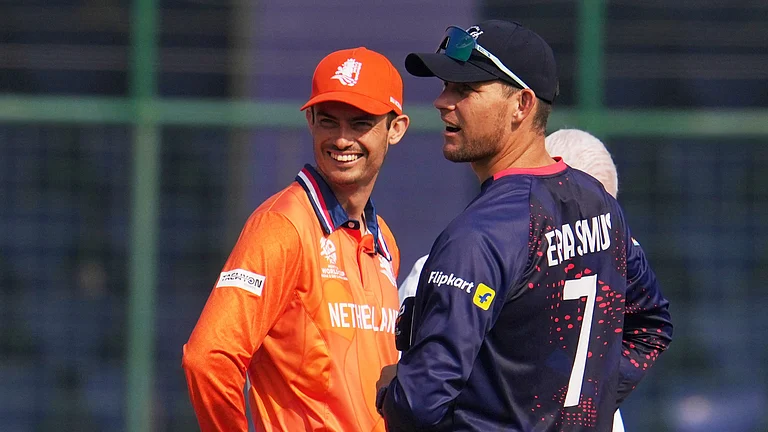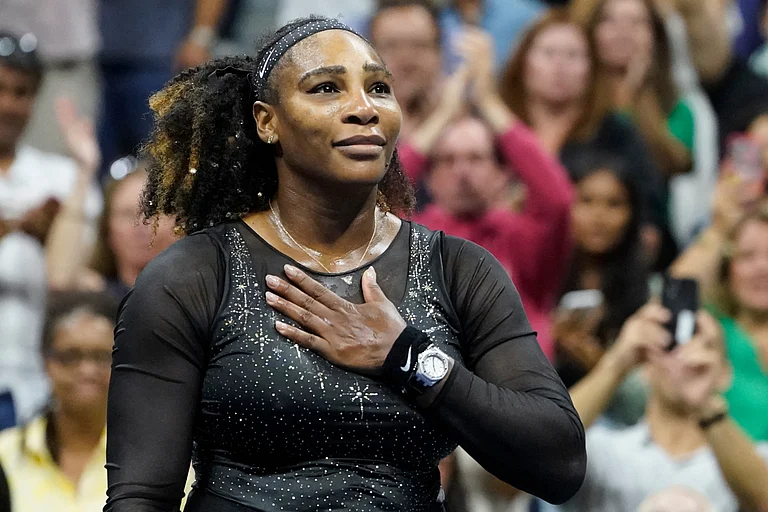Did you even expect success on this scale?
Of course not, who could.
When the award was announced you could hardly speak. What did you feel?
I don't know why I should say it was unexpected because you do have a one in six chance, but I don't know, I was just not expecting it. It was also partly because I was in the loo and I had to be dragged out, and come up two flights of steps. Then I heard them announcing it and I was out of breath, completely unprepared, and I had no idea what to say.
When did you think of doing this book, and when did you begin to write it?
How long back, well, it is all my life, I always knew I wanted to do this. Whether I could I didn't know, but that I wanted to, I did. It took me four-and-a-half years to write, and it has already been a year and a bit after it was written.
Have you read the other books shortlisted for the Booker?
No.
What next, will you be back at home in Delhi soon?
Yes. Of course.
Is the style of this book what you might call your style or is it a style for the story?
What's the difference?
If you were to write another novel, would this be your style or is it something specific to the story?
I don't know, I am an instinctive writer, I don't know if I'll ever write another novel and what kind of novel it would be or anything. I don't know.
There seemed to be some signs of discomfort among a lot of people when you won the award. An idea persists that if you don't write in your native language you can't write as well as those who do. Do you think this award has done its bit to put that myth at rest?
I don't think that you are right about the discomfort. That is something we would like to see, we would like to think
ki hamne number le liya, aur ye angrez aur gore log bahut gusse hain . Of course there must be people who think that, but just before the Booker night I was at Cheltenham. There were 300-400 people there, all white, and I didn't get any sense of that. But of course I know that England is a place where people think they know how language should be used. It may not be so much that I am not white but because language is used in an unorthodox way, that there are people who will resent that and think that's not the way it should be done. So it might just be a feeling against the book as opposed to any feeling about where I come from. It could be about the fact that it breaks rules which they don't think ought to be broken.
What has the response in India been like, do you sometimes find a greater warmth of response at events like the reading at Cheltenham than, say, in India?
No no no, not at all, nothing like India in that sense. Though I must say it's been a great feeling in America. But so it has been also in Finland, and in Norway. But in India there has been a lot of resentment against me as well, a lot of feeling that she got too much money and too much publicity, and this has upset a lot of people especially in the media. But you have to become a philosopher to go through this, and realise that everything is going to be twisted and turned.
Are there any Indian writers you particularly like?
Well, I do, I have, I mean I did admire
Midnight's Children . I think it's brilliant. I think Rushdie has a very good mind. It's just that I react against, I mean I don't write magic realism. And therefore when here they talk of Rushdie, every Indian writer has got lumped with him, and it's a bit irritating. I'm not trying to take anything away from him but I don't write magic realism. And I do think he's a very clever writer. But I am not a very well read person. I think that what is so good about Indian writers is that there is a sense of complexity because of the place where we come from. I think people like Amitav Ghosh and Vikram Seth, everyone is different, you know, it's amazing, and everyone wants to lump everyone together. But in fact they all have their own form of writing.
Do you foresee any trouble with translations because your book is so English language specific, and has so much to do with language?
First when I wrote it I did not think about translations at all. Obviously it didn't occur to me, I didn't even know if it would be published. But the translations have been coming out, it has been translated into 27 languages and obviously I can't read the translation but journalists come and tell me about it and it seems that though the book is so much to do with the sound and the play of words it has worked in every language.
What about translations in Indian languages, Malayalam for example. Will that be a special translation?
Yes, it will be for me because I understand and speak Malayalam. But unfortunately, and I feel very bad about this, I just can't afford to have those translations happen until this court case is sorted out.
Have you thought of filming the book yourself?
No.
Or someone else doing it?
No.


























